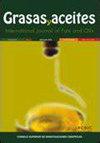米糠、芝麻油、橄榄油能否代替豆油提高法式沙拉酱的质量?
IF 1.1
4区 农林科学
Q4 CHEMISTRY, APPLIED
引用次数: 2
摘要
大豆油是一种常用的植物油,用于法国沙拉酱的工业生产。研究了米糠、芝麻油、橄榄油和大豆油对法式沙拉酱品质特性的影响。一个月后,含有大豆油的对照组的酸度、过氧化值(PV)最高,乳液稳定性最低(p<0.05)。用芝麻(T4)和米糠油(T3)配制的样品的PV最低。颜色测量结果表明,含有橄榄油(T2)的样品的a*受影响最大,并在第30天下降(p<0.05)。在流变学测试中,样品为固体粘弹性。T2的弹性模量和复粘度略高。最高和最低的总体感觉接受度分别属于T3和T2。因此,大豆油可以被取代以获得更理想的产品。最后,选择T3作为优良样品。本文章由计算机程序翻译,如有差异,请以英文原文为准。
Can rice bran, sesame, and olive oils be used as substitutes for soybean oil to improve French salad dressing quality?
Soybean oil is a commonly-used vegetable oil for the industrial manufacture of French salad dressing. The effect of rice bran, sesame, olive, and soybean oils on French salad dressing’s quality characteristics was investigated. After one month, the highest acidity, peroxide value (PV), and the lowest emulsion stability were observed in the control containing soybean oil (p < 0.05). Samples formulated with sesame (T4) and rice bran oils (T3) had the lowest PVs. Color measurement results indicated that a* of a sample containing olive oil (T2) was most influenced and declined on the 30th day (p < 0.05). In the rheological test, samples were solid viscoelastic. The elastic modulus and complex viscosity of T2 were slightly higher. The highest and the lowest overall sensory acceptance belonged to T3 and T2, respectively. Therefore, soybean oil could be replaced to obtain a more desirable product. Finally, T3 was selected as the superior sample.
求助全文
通过发布文献求助,成功后即可免费获取论文全文。
去求助
来源期刊

Grasas y Aceites
工程技术-食品科技
CiteScore
2.50
自引率
0.00%
发文量
50
审稿时长
3 months
期刊介绍:
Grasas y Aceites is a peer-reviewed journal devoted to the publication of original articles concerning the broad field of lipids, especially edible fats and oils from different origins, including non acyl lipids from microbial origin relevant to the food industry. It publishes full research articles, research notes, reviews as well as information on references, patents, and books.
Grasas y Aceites publishes original articles on basic or practical research, as well as review articles on lipid related topics in food science and technology, biology, (bio)chemistry, medical science, nutrition, (bio)technology, processing and engineering. Topics at the interface of basic research and applications are encouraged. Manuscripts related to by-products from the oil industry and the handling and treatment of the wastewaters are also welcomed.
Topics of special interest to Grasas y Aceites are:
-Lipid analysis, including sensory analysis
-Oleochemistry, including lipase modified lipids
-Biochemistry and molecular biology of lipids, including genetically modified oil crops and micro-organisms
-Lipids in health and disease, including functional foods and clinical studies
-Technical aspects of oil extraction and refining
-Processing and storage of oleaginous fruit, especially olive pickling
-Agricultural practices in oil crops, when affecting oil yield or quality
 求助内容:
求助内容: 应助结果提醒方式:
应助结果提醒方式:


